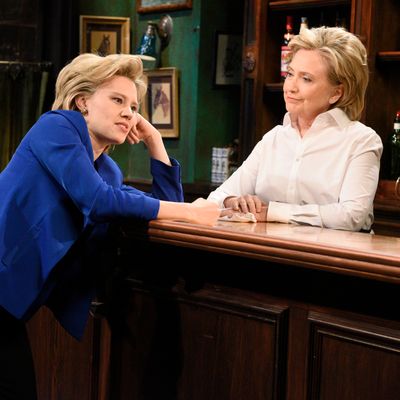
All week long, Vulture is taking a close look at Saturday Night Live’s biggest season in years.
Imagine, if you will, Saturday Night Live’s familiar closing piano chords playing; the Rock walks center stage to congratulate the cast on what a wonderful season it has been, and jokes about running for president. The audience laughs, because it’s seen for the obvious joke it is. Before he can wrap up his good-bye, Alec Baldwin sneaks up from behind, holding a Five-Timers Club jacket. (The Rock is the second new five-timer of the season, after Scarlett Johansson). The crowd cheers, as we haven’t seen Baldwin since his Baby Boss press tour, which he spent mostly joking about what a wild ride it was to impersonate Trump. (Trump and Baldwin have since made up, says “Page Six,” after a quiet dinner together at Jean-Georges.) Behind them, the cast claps and wraps their arms around each other. Bobby hugs Vanessa. There were rumors that they might leave, but it was such a good season they are going to see if they can make their schedules work. Beside them, Mikey Day, who had an unprecedented first year on the show, hugs Cecily, his partner on the beloved Anthony Weiner and Huma Abedin sketches. Kate McKinnon hugs Aidy Bryant, who was the real breakout of the season. Kate is still in her pantsuit from the final sketch of the night where she played President Clinton singing Leonard Cohen’s “Hallelujah” while looking at a picture of Donald Trump. The joke: Hallelujah that she won.
SNL is somewhere near the bottom of the list of institutions that were greatly affected by the election of Donald Trump, but it is on the list. You don’t need much more proof that the show expected Clinton to win than the fact that they had Baldwin playing Trump in the first place, a choice that, if long-term, would turn into a logistical nightmare. Trump winning, and quickly proving to be the president he promised to be, hijacked the show and the narrative of the season. SNL was poised to have a breakout year that defined this era and this cast, but instead, it got its most popular season in years and, for die-hard fans, one of its hardest to watch.
From the show’s first cast on, presidential elections have often been defining on SNL. More recently, both the Tina Fey era in 2000 and Seth Meyers era in 2008 benefitted from elections that thrust the show back into the spotlight after a few major cast-member departures. This summer, it felt like it was going to be another one of those seasons. The talent pool had reset and solidified after the departures of Kristen Wiig, Andy Samberg, Jason Sudeikis, Bill Hader, Fred Armisen, and Seth Meyers, and my fellow nerds were pumped to see what Chris Kelly and Sarah Schneider — famous for the insta-classics “Twin Bed,” “Wishin’ Boot,” and “The Beygency” —would bring to the show as co-head writers. A former cast member recalled to me in the fall the feeling of watching an early episode and thinking, “Oh, there are going to be people who say this is my favorite cast.” Specifically, it was a cast defined by its tremendous range and sheer amount of female talent. This season completely rejiggered the paradigm of the show: Women were the baseline, and the men were the others.
It was also supposed to be the season of Kate McKinnon. It’s easy to compare the momentum she had coming into the season to that of her idol, Kristen Wiig, when she came back after Bridesmaids made a lot of money at the box office. In Wiig’s case, she had already established herself as an all-encompassing talent (as Lorne Michaels likes to say, as one of the top three or four cast members ever). McKinnon, meanwhile, had shared the spotlight more with her other cast mates during her run. However, last summer, she was coming off an Emmy win for her performance on the show (becoming the first cast member to win since Dana Carvey) and a breakout role in Ghostbusters. Not to mention that McKinnon was a not-so-secret muse for head writers Kelly and Schneider. It felt like this was going to be her season, where she went full Wiig and just dominated, debuting a new character, impression, or skill set each week. Oh, and also, she was set to play Hillary Clinton.
The first few episodes back this season were uneven, as every episode of SNL has always been, but they were still clearly the show’s best in years, building to the October 22 Tom Hanks episode that is inarguably one of the best episodes, sketch-for-sketch, the show has ever done. Coming after Trump’s first tweet about the show, there was buzz surrounding the episode — SNL got to have an air of being important, but their non-topical material was still able to shine. Seven sketches went viral online the next day, each exhibiting a different comedic perspective. (Three of which – “Black Jeopardy,” “Funny New Comedy,” “Haunted Elevator” – made my year-end best-of list.)
And then, Donald Trump won the election. He tweeted about the show some more, instantly making it clear he wasn’t going to be like W. and sort of act normal for a while. SNL, in turn, didn’t let up on its topical material. In non-election times, SNL tends to have about one political sketch a week — traditionally as the cold open, as a way to remind people the show is written week-of — but this spring you’d routinely see three or four. And it wasn’t like before the election, when the Trump stuff was a rising tide that lifted all ships; it was a big ol’ wave that sank ’em.
If I could pinpoint the moment the political narrative completely overwhelmed the show, it was Melissa McCarthy’s initial turn as Sean Spicer. It was a tremendous performance, but ultimately, it helped contribute to the ways in which the show disappointed later in the season. When news came out that Trump was bothered that Spicer was played by a woman, things got out of control. How the show was to be defined from that point on was taken over by the media. People — especially those who don’t usually watch SNL — started projecting every hope and anxiety onto a show that, (1) Was never especially adept at the hard-hitting satire and (2) wasn’t going to be able to bring down the administration even if it were. Fancy publications wrote headlines on their covers like “Can Satire Save the Republic?” with a picture of Baldwin holding his Trump wig. The result was that every sketch that didn’t include Trump felt like a bummer to audiences, and every sketch that did slowly started feeling worse: Trump as a joke premise felt exhausted. And, conversely, the show couldn’t just aim for catharsis, as it’s impossible to be escapist — which, along with making people laugh, is the only thing political comedy can safely achieve — when you’re tasked with leading the resistance.
As a result, it sucked to work there. As I wrote in March, in a piece titled “SNL Has Never Been More Popular and Less Fun,” this season has been a slog for those who work on it, and worse yet, unlike an election season, it was a slog with no end in sight. It’s not that the show stopped making other comedy. But like with all things, Trump has proven to be like Kirby, a pastel-skinned circle who sucks up all the air and attention in the room.
Of course, it resulted in the show’s best ratings in years, but that short-term win is in direct opposition to the secret to the show’s long-term success. Where other great sketch shows tend to be defined by a single perspective and cast that is exhausted over time, SNL has been able to stay on the air because it is always changing. Every five to seven years or so there is a new cast, with new members, for a new generation of fans to fall in love with. This year didn’t give the cast room to elevate themselves, since the biggest parts every week were given to guest stars like Baldwin and McCarthy. Later this week, we are ranking every SNL cast, and while I truly think this year’s cast is as talented, or more so, than the majority in the show’s history, I had a hard time making a case for it.
All that said, there was some really funny, silly, dark, non-Trump stuff in the last few episodes this season that I liked quite a bit. I was really impressed by Julio Torres’s first season as a writer and Mikey Day’s first season as a cast member. Chance the Rapper, Solange, LCD Soundsystem, Tribe Called Quest, and Haim all gave particularly awesome musical performances. Still, the president loomed over the season, like so many Trump Grill Taco Bowl farts, leaving a stink that’s impossible to ignore.



